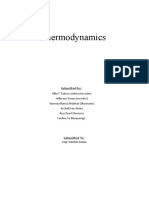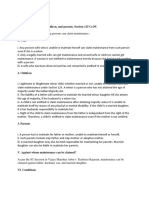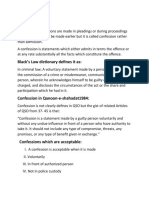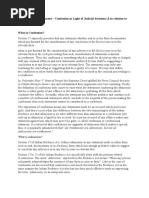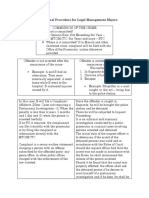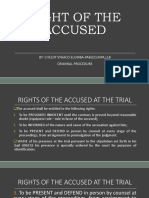0 ratings0% found this document useful (0 votes)
25 viewsCRPC
CRPC
Uploaded by
Rakshit BhalothiaThe document discusses confessions under Indian law. It defines a confession as an unconditional admission of guilt before a judicial magistrate, regardless of jurisdiction. Any judicial magistrate can record a confession during an investigation, even if they lack jurisdiction over the case, as long as they then send the confession to the proper magistrate. There are two types of confessions: judicial confessions made before a judicial magistrate, and extrajudicial confessions made elsewhere. A judicial confession alone can be the basis for conviction if voluntarily made without compulsion. The procedure for recording a confession under Section 164 of the Code of Criminal Procedure is also outlined.
Copyright:
© All Rights Reserved
Available Formats
Download as TXT, PDF, TXT or read online from Scribd
CRPC
CRPC
Uploaded by
Rakshit Bhalothia0 ratings0% found this document useful (0 votes)
25 views1 pageThe document discusses confessions under Indian law. It defines a confession as an unconditional admission of guilt before a judicial magistrate, regardless of jurisdiction. Any judicial magistrate can record a confession during an investigation, even if they lack jurisdiction over the case, as long as they then send the confession to the proper magistrate. There are two types of confessions: judicial confessions made before a judicial magistrate, and extrajudicial confessions made elsewhere. A judicial confession alone can be the basis for conviction if voluntarily made without compulsion. The procedure for recording a confession under Section 164 of the Code of Criminal Procedure is also outlined.
Original Title
Crpc
Copyright
© © All Rights Reserved
Available Formats
TXT, PDF, TXT or read online from Scribd
Share this document
Did you find this document useful?
Is this content inappropriate?
The document discusses confessions under Indian law. It defines a confession as an unconditional admission of guilt before a judicial magistrate, regardless of jurisdiction. Any judicial magistrate can record a confession during an investigation, even if they lack jurisdiction over the case, as long as they then send the confession to the proper magistrate. There are two types of confessions: judicial confessions made before a judicial magistrate, and extrajudicial confessions made elsewhere. A judicial confession alone can be the basis for conviction if voluntarily made without compulsion. The procedure for recording a confession under Section 164 of the Code of Criminal Procedure is also outlined.
Copyright:
© All Rights Reserved
Available Formats
Download as TXT, PDF, TXT or read online from Scribd
Download as txt, pdf, or txt
0 ratings0% found this document useful (0 votes)
25 views1 pageCRPC
CRPC
Uploaded by
Rakshit BhalothiaThe document discusses confessions under Indian law. It defines a confession as an unconditional admission of guilt before a judicial magistrate, regardless of jurisdiction. Any judicial magistrate can record a confession during an investigation, even if they lack jurisdiction over the case, as long as they then send the confession to the proper magistrate. There are two types of confessions: judicial confessions made before a judicial magistrate, and extrajudicial confessions made elsewhere. A judicial confession alone can be the basis for conviction if voluntarily made without compulsion. The procedure for recording a confession under Section 164 of the Code of Criminal Procedure is also outlined.
Copyright:
© All Rights Reserved
Available Formats
Download as TXT, PDF, TXT or read online from Scribd
Download as txt, pdf, or txt
You are on page 1of 1
The term confession has not been defined in any scope of law or in any act.
But it
may be defined as the admission of guilt in toto. A confessio nan accused admits
his
guilt unconditionally before a judicial magistrate, irrespective of its teritorial
jurisdiction. A confession under section 154 maybe recorded during the course of
investigation but prior.
Any magistrate may record the confession priovided that he is a judicial
magistrate. Even when the executive magistrate is performing the judicial functions
shall not record
a confession.
Q. Whether a magistrate record a confession if he lacks in jurisdiction to try the
case.
Yes the jurisdiction does not pass a magistrate from recording a confession.
However, after recording a confession the magistrate shall send the confession to
the
concerned magistrate who is having the authority to try the case.
Q. What is the evidential value of confession and types of confession?
Types- There are two types.
1- Judicial confession- Confession which an accused makes before the judicial
magistrate.
2- Extra judicial confession- Confession which is not being made before the
judicial magistrate.
Value- The judicial confession may become the sole basis of conviction. If it is
proved that it was made voluntarily and without any compulsion and duress.
No such sanctity may be awarded with the extra judicial confession and hence it can
not be the sole basis of the conviction and further corroboration required in
material
terms.
Q. What is the procedure of recording a confession under section 164?
Under section 164 of CrPC, it has been mandated that an accussed may record his
confession before the magistrate during the course of investigation. However,
before recording
the confession the magistrate shall inquire whether the confession is made
voluntarily. The magisttrate shall also warn the accussed that this confession
shall be used against
him and may become sole basis of convivtion and can be used as substantive
evidence. Further, the magistrate shall also inform the accused that you are not
bound to make
confession and may withdraw it. If the magistrate finds that the confession is not
voluntary then he shall reject the confession. No oath shall be administered to the
accussed
before making the confession. The confession must be recorded in the words and
language of the accused. After recording the confession the magistrate and the
accused both shall
sign the confession. Magistrate shall also endorse on the foot of that confession
that it has been inquired by the accused that it was volutary.
You might also like
- Evidence - RianoDocument40 pagesEvidence - RianoABEGAIL ATOK100% (5)
- Babb - 1963 - The Great Gatsby and The GrotesqueDocument14 pagesBabb - 1963 - The Great Gatsby and The GrotesqueErmanNo ratings yet
- RULE 115 - Rights of The AccusedDocument6 pagesRULE 115 - Rights of The Accusedjohn nestor cabus100% (2)
- Communication Theory ReadersDocument5 pagesCommunication Theory Readerselwen1975No ratings yet
- Thermodynamics 2Document205 pagesThermodynamics 2Allia TuboroNo ratings yet
- 1.maintenance of Wife, Children, and Parents. Section 125 CR - PCDocument22 pages1.maintenance of Wife, Children, and Parents. Section 125 CR - PCsuryaaNo ratings yet
- Confession A Detailed DiscussionDocument7 pagesConfession A Detailed DiscussionAmina Aamer100% (1)
- Evidence Law AssignmentDocument6 pagesEvidence Law AssignmentMeghna SudheerNo ratings yet
- Evidence Law - Test 2Document3 pagesEvidence Law - Test 2Ghazaal KhanNo ratings yet
- GAnusha PRL JCJ HusnabadDocument12 pagesGAnusha PRL JCJ HusnabadAkki daNo ratings yet
- STATEMENT AND CONFESSION UNDER SECTION 164 CRPCDocument2 pagesSTATEMENT AND CONFESSION UNDER SECTION 164 CRPCBiswaraj raulNo ratings yet
- Confession Under Indian Evidence Act PDFDocument21 pagesConfession Under Indian Evidence Act PDFharsh vardhan0% (1)
- Confession Under Indian Evidence ActDocument21 pagesConfession Under Indian Evidence Actmr dharniNo ratings yet
- EVIDENCEDocument13 pagesEVIDENCEJaiNo ratings yet
- Palvinder Kaur V State of Punjab: Confession AdmissionDocument17 pagesPalvinder Kaur V State of Punjab: Confession Admissioninpbm0No ratings yet
- CRPCDocument11 pagesCRPCTiyas RahaNo ratings yet
- Purpose of Arraignment and PleaDocument15 pagesPurpose of Arraignment and PleaAlelojo, NikkoNo ratings yet
- Law of EvidenceDocument12 pagesLaw of EvidenceSneh guptaNo ratings yet
- 164 CRPCDocument8 pages164 CRPCsaket anand50% (2)
- NOTES ON RULE 116-117Document14 pagesNOTES ON RULE 116-117Kenn Rhyan MisolesNo ratings yet
- Cr.A 445 2017 Adil Khan Vs Chinar GulDocument12 pagesCr.A 445 2017 Adil Khan Vs Chinar Gulharisshah.adv345No ratings yet
- Rights of the AccusedDocument9 pagesRights of the AccusedShana Marie C. GañoNo ratings yet
- Arraignment and Plea: 1. Double Jeopardy To Attach 2. Court Can Proceed Trial in Absentia in Case Accused AbscondsDocument19 pagesArraignment and Plea: 1. Double Jeopardy To Attach 2. Court Can Proceed Trial in Absentia in Case Accused AbscondsMarla LahNo ratings yet
- Complaint and VerificationDocument13 pagesComplaint and VerificationkartikNo ratings yet
- Statements U/s 161 of CR - PC: Section 161 Aims at Obtaining Evidence Which May Later BeDocument10 pagesStatements U/s 161 of CR - PC: Section 161 Aims at Obtaining Evidence Which May Later BeMuhammad NaeemNo ratings yet
- CRPC Sem 4 ExamDocument43 pagesCRPC Sem 4 ExamPreet PatelNo ratings yet
- Rule 115Document4 pagesRule 115Arwynne Lyle LabradorNo ratings yet
- Lecture 11 _Confessions_ (1)Document21 pagesLecture 11 _Confessions_ (1)Murtaza HayatNo ratings yet
- Criminal Procedures NOTEDocument16 pagesCriminal Procedures NOTEDekwerizNo ratings yet
- Criminal Procedure Notes 17 18Document2 pagesCriminal Procedure Notes 17 18Witch BRIONNENo ratings yet
- Purpose of Arraignment and PleaDocument7 pagesPurpose of Arraignment and PleaClaudine Arrabis100% (1)
- 1586987978NLS_ASSIGNMENT_2Document13 pages1586987978NLS_ASSIGNMENT_2Nwabueze JosephNo ratings yet
- 1586900976NLS AssignmentDocument12 pages1586900976NLS AssignmentIlori Shegun MykealNo ratings yet
- Assignment 1Document3 pagesAssignment 1CDT LIDEM JOSEPH LESTERNo ratings yet
- The Trial Procedure in The MagistratesDocument15 pagesThe Trial Procedure in The MagistratesBaguma Patrick RobertNo ratings yet
- CONFESSIONS MADE UNDER EVIDENCE AND CRPC 3... To Be MailedDocument6 pagesCONFESSIONS MADE UNDER EVIDENCE AND CRPC 3... To Be Mailed125117059No ratings yet
- CRPC Oral EvidenceDocument13 pagesCRPC Oral Evidencesparsh lalNo ratings yet
- Project EvidenceDocument22 pagesProject EvidenceRajneesh RamNo ratings yet
- Criminal Procedure ReviewerDocument12 pagesCriminal Procedure ReviewerSamantha BrownNo ratings yet
- Confession - Declaration of An Accused Acknowledging His Guilt of The Offense ChargedDocument3 pagesConfession - Declaration of An Accused Acknowledging His Guilt of The Offense ChargedMowie AngelesNo ratings yet
- Literature CONFESSIONDocument10 pagesLiterature CONFESSIONsanjayNo ratings yet
- Evidentiary Value of FIRDocument24 pagesEvidentiary Value of FIRPAULOMI DASNo ratings yet
- Rule 116Document34 pagesRule 116Faith LacreteNo ratings yet
- Rule 115: Rights of The AccusedDocument2 pagesRule 115: Rights of The AccusedWitch BRIONNENo ratings yet
- Evidance 1Document11 pagesEvidance 1rtjadhav158721804No ratings yet
- Stages of A Murder TrialDocument7 pagesStages of A Murder TrialGautam KrishnaNo ratings yet
- Section 164 Crpc-Recording of Confessional Statement: Muthuswamy V State of MadrasDocument5 pagesSection 164 Crpc-Recording of Confessional Statement: Muthuswamy V State of MadrasishaNo ratings yet
- ConfessionDocument11 pagesConfessionshubhpoddarNo ratings yet
- Confessions Under The Indian Evidence Act 1872Document5 pagesConfessions Under The Indian Evidence Act 1872Akhil DeoraNo ratings yet
- Forms of ConfessionDocument3 pagesForms of ConfessionTAJ AHAMEDNo ratings yet
- Section 164. Recording of Confessions and Statements.Document9 pagesSection 164. Recording of Confessions and Statements.tanya sethNo ratings yet
- The Procedure of Hearing and Determining Cases in The High CourtDocument5 pagesThe Procedure of Hearing and Determining Cases in The High CourtBaguma Patrick RobertNo ratings yet
- Crimbus - Basic Flow Criminal ProceedingsDocument4 pagesCrimbus - Basic Flow Criminal ProceedingsAngel Alyssa SantosNo ratings yet
- Search and SeizureDocument5 pagesSearch and SeizureKen AliudinNo ratings yet
- Criminal TrialDocument31 pagesCriminal TrialSurabhi Rathaur100% (1)
- WitnessesDocument15 pagesWitnessesbeyoncetanyaradzwa5No ratings yet
- The AccusedDocument47 pagesThe AccusedName ToomNo ratings yet
- Law of Evidence Legal Ethics Zubair AhmedDocument21 pagesLaw of Evidence Legal Ethics Zubair AhmedMuhammad ShahbanNo ratings yet
- Evidentiary Value of FIRDocument22 pagesEvidentiary Value of FIRAISHANI PATTANAIKNo ratings yet
- Mala ProhibitaDocument41 pagesMala Prohibitadaden_may11No ratings yet
- Conduct of Trial Proceedings Before The High CourtDocument45 pagesConduct of Trial Proceedings Before The High CourtNyakuni NobertNo ratings yet
- New York Notary Public Study Guide with 5 Practice Exams: 200 Practice Questions and 50+ Bonus Questions IncludedFrom EverandNew York Notary Public Study Guide with 5 Practice Exams: 200 Practice Questions and 50+ Bonus Questions IncludedRating: 5 out of 5 stars5/5 (1)
- Abhilasa vs. Prakash Appellant MemoDocument19 pagesAbhilasa vs. Prakash Appellant MemoAditya Chavan100% (3)
- Examination of Common Shorts Cases in Surgery (24pgs) PDFDocument24 pagesExamination of Common Shorts Cases in Surgery (24pgs) PDFAparna Devi100% (3)
- Sabroe Product Catalogue 2014Document31 pagesSabroe Product Catalogue 2014Féderer István100% (1)
- Polypropylene PDFDocument296 pagesPolypropylene PDFdavid francoNo ratings yet
- Musical Theatre ResumeDocument2 pagesMusical Theatre ResumeBrody StaffordNo ratings yet
- Pra Us Bahasa Inggris 2021 SMPK BPK Penabur: ApologisingDocument7 pagesPra Us Bahasa Inggris 2021 SMPK BPK Penabur: ApologisingKeitjeNo ratings yet
- 01-Alkemista-CORE-BriefDocument26 pages01-Alkemista-CORE-BriefPawan SainiNo ratings yet
- Course Guide EDTECH 212Document4 pagesCourse Guide EDTECH 212Darryl Myr FloranoNo ratings yet
- Audio 3Document3 pagesAudio 3Ahmad TNo ratings yet
- MM7Document2 pagesMM7Huỳnh Ngan AnhNo ratings yet
- DiatomsDocument14 pagesDiatomsAurora ÇizmjaNo ratings yet
- FACE 2 Years Advanced Orthodontics ProgramDocument9 pagesFACE 2 Years Advanced Orthodontics ProgramFace-Course RomaniaNo ratings yet
- The AztecDocument14 pagesThe Aztecnouran harrasNo ratings yet
- Boricubos - LATAM MonstersDocument122 pagesBoricubos - LATAM Monstersguilherme guiNo ratings yet
- BML5Document4 pagesBML5jafasoh293No ratings yet
- Devil's SinnerDocument92 pagesDevil's SinnerRishita RamolaNo ratings yet
- The Oil & Gas Business: IT Integration: Collaboration Is KeyDocument2 pagesThe Oil & Gas Business: IT Integration: Collaboration Is KeyroshmediaNo ratings yet
- Terms and Conditions LEGAL NOTICE The Publisher Has Strived To Be As Accurate and Complete As Possible in The Creation of This Report, Notwithstanding The Fact That He Does Not Warrant or RepresenDocument7 pagesTerms and Conditions LEGAL NOTICE The Publisher Has Strived To Be As Accurate and Complete As Possible in The Creation of This Report, Notwithstanding The Fact That He Does Not Warrant or Represent 2No ratings yet
- Ayurvedic Medicine and Public Perception Its Potential Benefits, Limitations, and The Need For Evidence-Based PracticeDocument3 pagesAyurvedic Medicine and Public Perception Its Potential Benefits, Limitations, and The Need For Evidence-Based PracticeVrinda TrehanNo ratings yet
- Effects of The Use of Cellphone To The Academic PerformanceDocument40 pagesEffects of The Use of Cellphone To The Academic PerformanceKaykay ZamoraNo ratings yet
- Mere Christianity Book I II III C S LewiDocument5 pagesMere Christianity Book I II III C S LewiZeyneb Es SAKAFİNo ratings yet
- Learning Approach: Key AssumptionsDocument26 pagesLearning Approach: Key AssumptionsAina PieraNo ratings yet
- Module 3 EspDocument10 pagesModule 3 EspLeigh Bao-iranNo ratings yet
- Direction: Encircle The Correc 1. A. B. C. D. 2. 11Document1 pageDirection: Encircle The Correc 1. A. B. C. D. 2. 11usepjonah compostelaNo ratings yet
- The Business EnvironmentDocument10 pagesThe Business Environmentarlindo Hartono0% (1)
- TOEFL Speaking Tasks 1. Personal PreferenceDocument1 pageTOEFL Speaking Tasks 1. Personal PreferencegatosurferNo ratings yet
- ScriptDocument16 pagesScriptWarlitha DucayNo ratings yet




